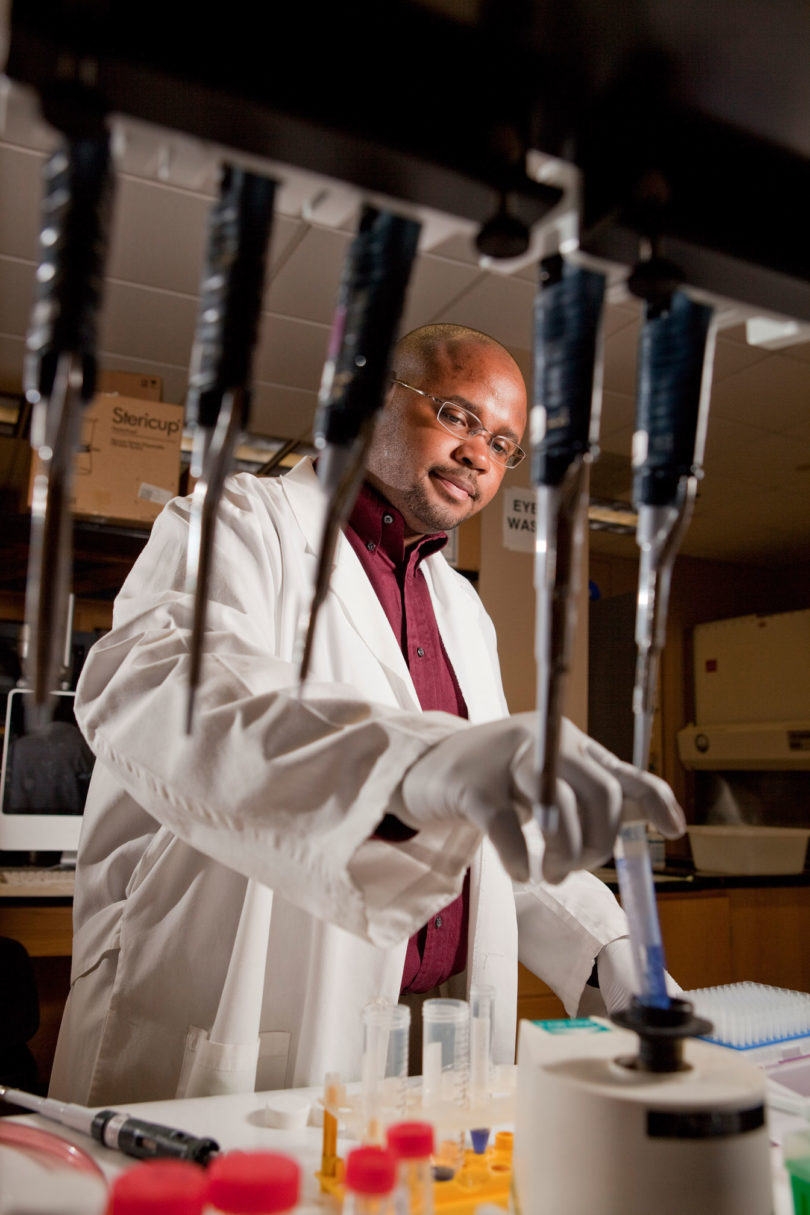Rarely do new assistant professors show up for their first week of work, hold a press conference and find their name and photo plastered in news reports around the world.
Franklin West did.
“It was a pretty wild start,” said West, an animal and dairy science faculty member in the College of Agricultural and Environmental Sciences. “It took a while for things to slow down, but now it has, and I’m moving on with my work.”
West worked at UGA for more than a year in the Regenerative Bioscience Center lab of world-renowned scientist Steve Stice. The duo developed a new way to create pigs with pluripotent cells that allows them to sidestep the controversial cloning process. It was a breakthrough Stice had searched two decades for. West found the key.
The announcement took the stem-cell science world by storm. The discovery first led them to create better pig models for human medical models.
“Pigs are much more like humans physiologically than mice or other animals used in labs,” West said. “Our pigs make the perfect model to study organ and tissue transplant, isolets for better diabetes treatments and treatments for degenerative diseases like Parkinson’s, because their cells are pluripotent (able to turn into any cell in the human body).”
The breakthrough resulted in worldwide acclaim, but none was more exciting to West and his family than the big story in his hometown paper, The Augusta Chronicle. West reported his dad set the alarm for 4 a.m. so he could meet the newspaper delivery truck at a local store and buy copies to share.
After being the subject of a major feature story in the July edition of Georgia Trend Magazine about the pig discovery, West was named one of the magazine’s “40 Under 40”-a list that highlights the best and brightest young Georgians younger than 40 years old. West is 28.
“Steve (Stice) made the list of ‘Most Notable’ Georgians,” West is quick to point out.
West has worked with Stice for seven years, first as a researcher with the Stice-owned stem-cell technology Aruna Biomedical before joining his bioscience lab. Now, West is setting up his own UGA lab where he will continue his work making germ cells from stem cells.
“It’s exciting to get to plan my lab and work so closely with students on experimental design, data analysis and germ cell theory,” he said. “But, it’s nice to have Steve close by to collaborate with. Having someone of his caliber to work with helps attract grants and other funding that help you build a great lab.”
West is testing ways to use neural cells from the pigs to help stroke and Parkinson’s victims
.
“Next we will examine meiosis in germ cells that cause infertility, fragile X and host of other conditions that cause conditions like Down Syndrome,” he said. “The pigs are good models to study that.”
Ecology was West’s first career track. He traveled to Kenya to study mating choice in baboons. He then went to Cornell University to study how snails impact plant life and muscles in intercoastal waterways.
His interest in ecology led him to search for ways to marry his passion for nature and his knowledge of stem cells to save endangered species. By using his studies of cloning and germ cells he wants to find ways to save dying breeds faster. He has projects under way with Zoo Atlanta to look at ways to save snow leopards and other endangered animals.
“Working with Steve on projects helps us have the critical mass and equipment to get things done,” West said. “But having my own lab allows me to try out my ideas and make them happen.”
Although he grew up in the city, his family had horses, chickens, goats, ducks and other animals.
“My friends always thought it was so cool to go to my house and pet animals and ride horses,” he said.
Today, thousands are hoping West’s “pharm” animals will save their lives.





